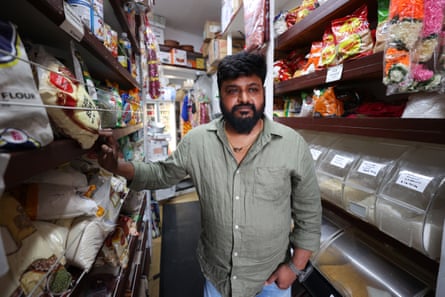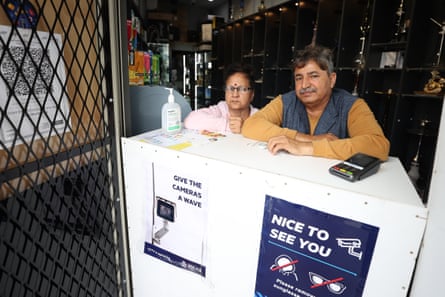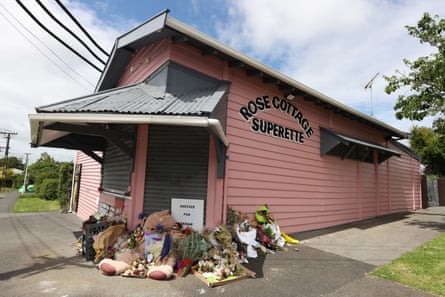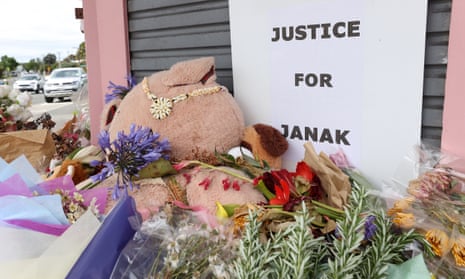Outside Rose Cottage Dairy, layers of flowers are drying on the footpath. Store-bought arrangements are mixed with jasmine, rosemary and geraniums hand-cut from local gardens. For the past week, the shop has remained shuttered, lace curtains closed, corrugated iron rolled down over the door. Behind the flowers is a sign: “Justice for Janak”.
Two weeks have passed since Janak Patel was murdered as he worked at this small Sandringham shop, allegedly stabbed after he pursued a man who had stolen a cash register. His death came at the close of a year that has left store owners across New Zealand reeling from a series of robberies, ram raids and break-ins. As the community grieves, his death has also become a focal point for New Zealanders’ concerns about crime, and the political struggle surrounding it. With election year approaching, the anxieties and grief of small shop owners have been catapulted on to the national stage, subject to politicians’ press releases, talkback radio monologues and parliamentary debate.
In a small Indian grocer on Sandringham’s main street, Suresh RRK stands behind the till, surrounded by stacks of plastic-wrapped roti, bags of pulses and toasted rice flour. He greets customers with a smile – but says every new face, or slightly unusual bit of behaviour, sends a bolt of anxiety though him.

“Anyone – any stranger, new customer, we are nervous,” he says. Last week, he felt anxious about a group of three people who he didn’t recognise – so shut down the entrance to the vegetable shop and gathered his family in the next room to wait until they had left.
“The community is 100% scared, and they are on the edge,” says Sandringham Business Association chair Jithin Chittibomma. “The good thing is that they’re still watching out for each other … [but] the general sense is disappointment, sadness, frustration, and fear.”
Sandringham is a small, close-knit community, known as Auckland’s “Little India” for its proliferation of spice shops, South Indian grocers, and some of the city’s best restaurants. It is studded with corner stores, known as “dairies”. They are small, typically family-owned, and many are operated by first or second generation immigrant families.
Dairies are a ubiquitous presence on New Zealand’s suburban blocks and high streets, providing an axis around which communities orbit and purchase their essentials. Over the past year, they have also found themselves a target for robberies, often carried out with the involvement of very young children. Both the frequency and the violence of these crimes have shocked many New Zealanders: dairies don’t carry valuable goods, and are often being attacked for no more than a few packs of cigarettes and a till-full of change.
“I don’t know, where did New Zealand go?” asks the owner of one local store, who asks not to be named as she is hoping to sell the business. “It was such a peaceful, beautiful country before. I don’t know what happened.” Her storefront is still covered with plywood from the last ram raid, which buckled the metal doors. Before they could secure it, she says her husband began sleeping on the shop floor to try and scare off any intruders.
Subhash Batra stands at the entrance of Fume vape shop. He has a warm smile, groomed moustache and a house full of trophies for table tennis, which he plays nationally. His three sons came to New Zealand to study and live – and when he and his wife joined them, he said it sounded like paradise.
“We were told New Zealand is a crime-free country,” he says. This year, the vape store has been targeted for robbery five times.

A few months ago two girls, 13-14 years old, robbed him and his wife at knife-point after he refused to serve them without proof of age. The robbery left the couple terrified: they erected new caging around the doors and blocked one of the entranceways with a large wooden plinth. But Batra was also shocked by the age of the attackers. “Like my own child – I tried to tell her ‘don’t do this, don’t get into this. You’re ruining your life. There’s nothing good in this’,” he says.
As the girls grabbed packages of nicotine products, he says, “They were also shivering – I mean, they’re little girls, they themselves are scared, you know.”
Many who live here share Batra’s shock at the age of assailants – which reveal a thorny underbelly of social deprivation and dysfunction rarely associated with New Zealand’s progressive international image.
At Patel’s funeral, he was farewelled as a “true family man”. His “death is too close to home. We all come from immigrant families. We have seen hardship which we shouldn’t have to,” said Mitesh Dhanji, master of ceremonies at the funeral. Born in the Indian city of Navsari, Gujarat, he had arrived in New Zealand only in April, after a decade in the UK. He was temporarily running the dairy where he died, while its owner was overseas. Dhanji told mourners that Patel and his wife had a “dream to run their own business”.
Youth crime has burst back into New Zealand’s public consciousness and is quickly establishing itself as a key issue in next year’s election. Overall, youth crime in New Zealand has trended steadily down since 2015.
This year however, a few categories began to buck the overall trend: youth offending rose – although it has still not returned to anywhere near 2015 levels – and among very young offenders – those aged 10-15 – car robberies have approximately doubled over the past five years. These upward curves coincided with a spate of high-profile ‘ram-raid robberies’, where stolen cars were driven into storefronts to burst open locked doors or windows. A number of the drivers of these cars were aged between 10 and 13 years old – too young even for the residential youth justice system.

Ram raids often produce dramatic surveillance footage, generating enormous media coverage. According to public sentiment surveying by Ipsos, New Zealanders’ concerns about crime is at the highest level since polling began in 2018, with respondents rating it as the second most important issue the country will be face over the next five years.
The problem has prompted a flow of policy offerings from both sides of the political aisle – military bootcamps from centre-right National, and the promise of more wraparound services and funding for shops’ safety measures from Labour.
The week after Patel’s death, dairy owners across the country closed their shops for two hours in recognition of his passing. Some gathered in protest outside prime minister Jacinda Ardern’s office, chanting “Enough is enough.”
Behind the counter of SS Supermarket, Suresh sighs, and says he is sceptical when he sees the community’s grief wielded by politicians on the national stage. He feels some have been quick to capitalise on a tragedy with “tough on crime” slogans and electioneering.
“Some people are taking personal advantage for political gain,” he says. “Political parties, they should come together. The other parties shouldn’t blame the ruling party, the ruling party should not blame the party that’s the opposition – they should come together to make a solution to this. This is not a political game.”
